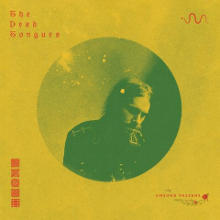The Graham Album Review #1946

Click on CD Cover for Audio Review in streaming mp3 format | |
The Dead Tongues: Unsung Passages
by George Graham
(Independent Release As broadcast on WVIA-FM 6/20/2018)

Click on CD Cover for Audio Review in streaming mp3 format | |
The Dead Tongues: Unsung Passages
by George Graham
(Independent Release As broadcast on WVIA-FM 6/20/2018)
The indie rock scene has brought forth groups ranging from bad garage bands to overly slick electronic projects, which are by definition, created by the artists themselves in the absence of a record company, and presumably the guidance or interference the label would provide. Much of indie rock has a tends to have edgy sound, loud and intentionally unsophisticated. This week, we have an interesting mostly acoustic indie project by The Dead Tongues, an album called Unsung Passage.
Like a lot of indie projects these days, The Dead Tongues is essentially the work of a single person with a supporting cast. In this case, it’s North Carolina-based Ryan Gustafson, who has been recording on his own and with others for about nine years now. This is his third album under the Dead Tongues moniker, and he previously released one under his own name in 2009. For the past couple of years, he has also been a member of the North Carolina band Hiss Golden Messenger.
Gustafson is a peripatetic type who at age 20, began the first of many long treks, backpacking across Europe. He hitchhiked from Oregon to New Orleans with a banjo, and crossed the country hippie-style in an old school bus. He is almost constantly on the road performing in one capacity or another, and his web bio says that after living for a few years in a commune in Ashville, North Carolina, he is living in a camper nearby. His wanderlust is reflected in the lyrics to the songs on the new album, which also considers such issues as relationships and the ephemeral nature of life. He says that he wrote the songs in the short periods between his road trips.
Gustafson plays some very nice finger-picked folky acoustic guitar, and is joined by an eclectic ensemble which includes a flute, a string trio including cello, plus a rhythm section with drums and bass, and eclectic instruments like an old retro-sounding Mellotron, plus more traditional instruments like Dobro and banjo. The main supporting cast includes James Wallace on drums and keyboards, Sally Sarlé on flute and vocals, with Jeff Crawford and Casey Toll alternating on bass. Together, they make music that sometimes has echoes of Appalachian traditional old-time folk, but can also get somewhat ethereal and spacey. It’s all quite tastefully done.
Opening the ten-song album is a piece which epitomizes it, Won’t Be Long, with its rather traditionally folky sound, seasoned by Ms. Sarlé s flute, and lyrics about wandering. <<>>
Ebb and Flow shows some of the influence of traditional Appalachian folk, with its banjo, and spooky minor-key sound. <<>>
Another song of wanderlust is Pale November Dew with its attractive guitar finger- picking by Gustafson. <<>>
The album’s lengthiest piece is called My Other, which is described on the band’s website as “meditations on mortality and devotion.” <<>> It highlights the album’s eclectic acoustic sound with the string ensemble appearing for a kind of atmospheric jam in the middle of the piece. <<>>
The Broken Side of People Everywhere is a love song that considers impermanence, in a the setting of a nice waltz that melds the folky with the flute and cello. <<>>
Also showing the old-time folk sound at first is Thunder and Crash, which can be a bit reminiscent of the music of Gillian Welch, but it gets eclectic with the sound of the retro Mellotron. <<>>
A track called Like a Dream is one instance when the group gets a little electric, after starting with the group’s mostly acoustic sound. A kind of ad hoc-sounding chorus comes in to chant the album’s title. <<>>
A definite highlight of the record is The Giver, done with banjo, also with the texture of an old-time song from the hills of Appalachia. <<>>
Unsung Passage the new third album by North Carolina-based The Dead Tongues is a creative and worthwhile recording of the songs by principal member Ryan Gustafson, many inspired by his wandering life. The sound is an interesting mix of old-time folk elements with a kind of ethos of the contemporary indie rock scene. The mostly acoustic instrumentation brings in more eclectic elements such as cello and strings, and the prominent flute, to the classic folk finger-picked guitar and banjo. It’s done with sense of taste and an understanding of the traditional folk influence upon which the album draws.
Our grade for sound quality is close to an “A.” The sound is fairly clean, but also has some studio effects to help with the ethereal quality, and that is well-handled, with Gustafson himself doing much of the mixing.
Indie bands don’t have to be grungy guitars and off-key vocals, as so many are. The Dead Tongues keep things mostly acoustic with a bunch of literate songs while keeping the indie-rock way of doing things.
(c) Copyright 2018 George D. Graham. All rights reserved.
This review may not be copied to another Web site without written permission.
 To Index of Album Reviews | To George Graham's Home Page. | What's New on This Site.
To Index of Album Reviews | To George Graham's Home Page. | What's New on This Site.